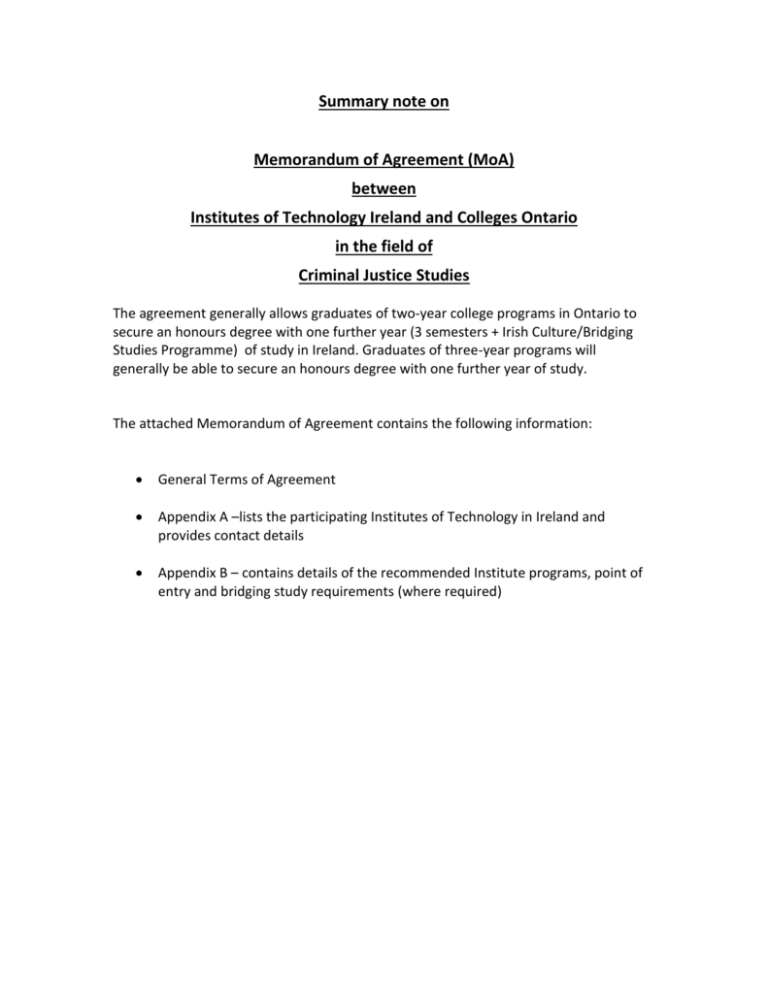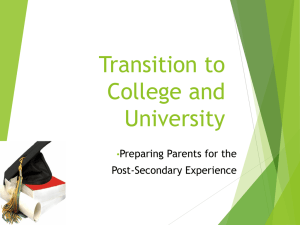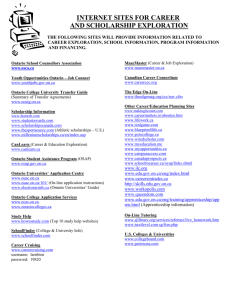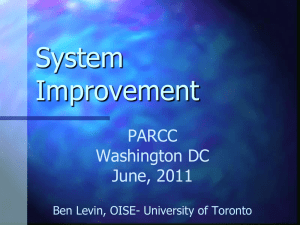Memorandum of Agreement - Institutes of Technology Ireland
advertisement

Summary note on Memorandum of Agreement (MoA) between Institutes of Technology Ireland and Colleges Ontario in the field of Criminal Justice Studies The agreement generally allows graduates of two-year college programs in Ontario to secure an honours degree with one further year (3 semesters + Irish Culture/Bridging Studies Programme) of study in Ireland. Graduates of three-year programs will generally be able to secure an honours degree with one further year of study. The attached Memorandum of Agreement contains the following information: General Terms of Agreement Appendix A –lists the participating Institutes of Technology in Ireland and provides contact details Appendix B – contains details of the recommended Institute programs, point of entry and bridging study requirements (where required) Memorandum of Agreement (MoA) in relation to Programme Articulation Arrangements between Institutes of Technology Ireland and Colleges Ontario in the field of Criminal Justice Studies General Terms of Agreement Colleges Ontario and Institutes of Technology Ireland (IoTI) have signed a Memorandum of Understanding (MoU) committing to ongoing collaboration on several important fronts. Under the umbrella of this MoU, specific student pathways have been identified that enhance the professional and international learning opportunities for the graduates of Ontario colleges that are affiliated with Colleges Ontario and of Institutes of Technology that are affiliated with IoTI. In each program area for which there is mutual interest in student pathway development, a team of Ontario and Irish discipline experts have undertaken an alignment and gap analysis based on a comparison of Irish National and Ontario Qualifications Frameworks. Further analysis of a representative sample of program curricula identified that specific curricula vary in focus, the balance of theory and application, and course content. Based on these analyses, the discipline expert teams recommend to the receiving Institutes of Technology a) Block Baccalaureate credit for related Ontario Diploma study, b) Relevant qualifications and bridging requirements and c)Point-of-entry to honours baccalaureate programmes. This MoA offers these recommendations with the understanding that the Institutes and Colleges are the sole arbiters in relation to their academic commitments and that individual institutions will make all final decisions in relation to their participation or otherwise under the terms of this agreement. All of the Ontario Colleges that are members of Colleges Ontario and that offer the program(s) designated in this MoA are parties to this MoA. It is hereby agreed between the Ontario Colleges, who are parties to this MoA, and the Institutes of Technology (IoT), Ireland, listed in Appendix A below, that graduates of Ontario Colleges Diploma and Advanced Diploma programs that meet the Ontario Ministry of Training, Colleges and Universities' (MTCU) Learning Outcomes Program Standards for the field of Social Care/Social Services are eligible for consideration for admission to the IoT programmes listed in Appendix B below. Alignment Studies Graduates from the Ontario Colleges, who qualify for consideration for admission as specified above, will need to complete studies as detailed in Appendix B, or equivalent, in Canada, Ireland or elsewhere, to qualify for entry to the listed Institute of Technology, Ireland programmes. Grade Requirements To be eligible for consideration for entry to matching IoT, Ireland programmes, Ontario Colleges’ students will need to have achieved or bettered the following grade averages: Diploma – 60% Advanced Diploma – 60% These entry grade requirements will be subject to periodic review. Appendix A – IoTs Party to this MoA IoT Waterford Institute of Technology Web site www.wit.ie Contact Details Dr. Michael Howlett Head of Department of Applied Arts mhowlett@wit.ie Appendix B – Required Alignment Studies Institute of Technology IoT Programme CO Programme Recommended CO Programme NFQ Level Recommende d CO Number of NFQ Credits Recommended IoT Programme Point of Entry Alignment Study Requirements Exemption Recommendations Recommended Note to Students Waterford Institute of Technology BA Honours in Criminal Justice Studies PFND 6 120 Year 2/3 WIT has a 3 year, level 8, degree in Criminal Justice Studies. To be considered on an individual college basis to facilitate alignment studies. Incoming Diploma graduates will complete 3 semesters in Ireland to complete the honours Bachelor degree. Semesters in WIT operate from September to December and from January to May. Incoming students will be required to undertake an Irish Cultural/Bridging Studies Summer Programme before beginning their 2nd Semesters of studies in September. They will also have to complete a Comparative Independent Study Article during the vacation period immediately following completion of their 3rd Semester. This can be completed in Canada but must be submitted to WIT Institute of Technology IoT Programme CO Programme Recommended CO Programme NFQ Level Recommende d CO Number of NFQ Credits Recommended IoT Programme Point of Entry Alignment Study Requirements Exemption Recommendations Recommended Note to Students before the beginning of September. Students must complete and pass all elements of the programme before graduation. Notes 1. The Irish Culture/Bridging Studies Summer Programme is mandatory and must be completed before students can progress onto the scheduled semesters. Study Requirements refer to modules that CO graduates must complete to ensure that they meet the entry requirements of WIT programmes that are cognate with the Diplomas and Advanced Diplomas that they have completed. Alignment study requirements may vary somewhat from Institute to Institute and may be updated in line with programme changes. Students should contact the Institute of interest in advance to ensure that full details of alignment studies are reviewed before they make final decisions re: submitting applications for admission. 2. The Exemption Recommendations column refers to cases where CO graduates have completed learning for which they can be granted exemptions in the IoTI system. 3. It is important that both alignment and exemption details be specified where relevant as, with a combination of alignment and exemption modules, CO graduates may be in a position to avail of "customised semesters” 5 and 6 in the IoT system during which they can complete the extra modules required for alignment purposes while completing fewer modules in subject areas in which they are already well qualified.




